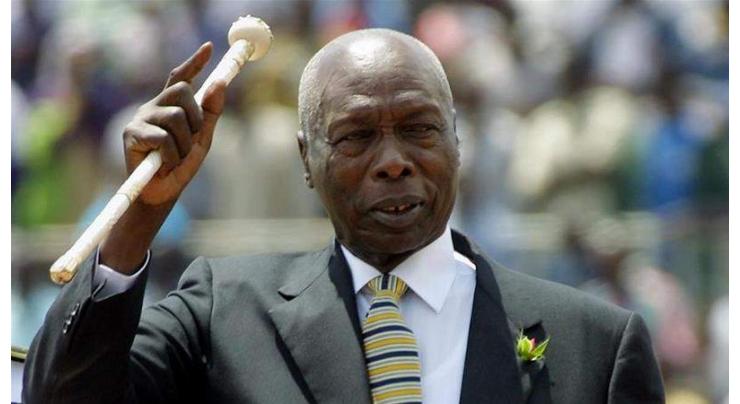
Daniel Arap Moi, Kenya's Iron-fisted Second President
Faizan Hashmi Published February 04, 2020 | 12:19 PM

Kenya's second president Daniel arap Moi took power promising peace, love and unity, but ended up mired in graft scandals, stifling democracy and fanning the dangerous embers of tribalism
Nairobi, (APP - UrduPoint / Pakistan Point News - 4th Feb, 2020 ) :Kenya's second president Daniel arap Moi took power promising peace, love and unity, but ended up mired in graft scandals, stifling democracy and fanning the dangerous embers of tribalism.
Leading Kenya from 1978-2002 with an iron fist, his 24-year reign was infamous for torture, corruption, the crushing of opposition voices and arbitrary detentions without trial.
Moi died peacefully aged 95 on Tuesday, his family said.
Politically astute, he was also accused of encouraging ethnic divisions to further his own political ambitions, tribal rivalries that would leave thousands dead in later years, including contested elections in 2007.
"Ordinary citizens found themselves the target of state repression, and torture and imprisonment became part of the regular engagement between rulers and ruled," Daniel Branch, from Britain's University of Warwick, wrote in his book on Kenya's post-independence politics.
But Moi was also credited with helming a relatively peaceful nation in a region mired by bloody conflicts, including genocide in Rwanda and civil wars in Burundi and Somalia.
- Peace at cost of freedom - Brought up in a poor family from the Kalenjin people, in the cattle-herding and farming county of Baringo, some 300 kilometres (185 miles) north of the capital Nairobi, Moi received a Christian education before heading into teaching.
But he was soon drawn to politics, serving in legislative councils under British colonial rule in the run up to independence in 1963, after which he would serve in government under Kenya's first president, Jomo Kenyatta, rising eventually to be his deputy.
When Kenyatta died in 1978, Moi succeeded to the top job, fighting a tough political battle to secure it from rivals.
Moi's rise to power heralded Kenya's final descent into a single party state, with the multi-party system crushed and critical voices tortured or jailed without trial.
A botched coup in 1982 by airforce officers was a turning point, with Moi's reaction swift and harsh, arresting or sacking dozens.
Lines were drawn and perceived enemies were mercilessly tackled, with those in the regime's cross hairs including cultural or rights activists such as author Ngugi wa Thiong'o, or environmentalist Wangari Maathai, who later won a Nobel Peace prize.
The 1980s in Kenya were tough times, with university students demonstrating -- protests that were quickly crushed -- amid runaway inflation, high unemployment and rampant corruption by Moi and a powerful surrounding clique.
Top of the graft scams was the Goldenberg scandal, dealing a crippling blow to the economy, with around a billion Dollars siphoned from government coffers under a compensation scheme for export of non-existent gold and diamonds.
As recently as May 2019, a court found Moi guilty of grabbing land, and ordered he pay part of nearly $10 million to the rightful owners of a property he sold.
"Kenyans became ever more resentful of Moi's government, but because of his ability to work networks of patronage and state institutions to his advantage, the president survived without serious threat to his rule," Branch added.
Related Topics
Recent Stories

Bugti assures transporters for addressing their problems

Deputy Prime Minister and Foreign Minister, Mohammad Ishaq Dar meets foreign min ..

3 drug peddlers arrested, hashish recovered

1496,990 children given polio drops in five days: DC

Six terrorists killed, hideout busted in N Waziristan IBO: ISPR

Pakistan, Qatar agree to further expand trade, investment ties

Sindh cabinet approves Rs177.5m to strengthen, mobilize various wings of police

Faisal Karim Kundi takes oath as new KP Governor

Azad Jammu and Kashmir Prime Minister Anwaar ul Haq Chaudhry seeks more vibrant ..

Tahaffuz Manzil Foster Home providing care & support to homeless children

PCB proposes April 7 -May 20 window; tweaks in rules for HBL PSL 2025

Field hospitals now operational across Punjab: Azma Bukhari
More Stories From World
-
Football: French Ligue 1 results - collated
2 hours ago -
Football: Italian Serie A results - collated
2 hours ago -
European Champions Cup semi-final result
2 hours ago -
Football: Italian Serie A table
2 hours ago -
Tennis: WTA Madrid Open results
2 hours ago -
Formula One: Miami Grand Prix sprint race results
2 hours ago
-
Barca have 'huge amount' to change next season: coach Xavi
2 hours ago -
Haaland 'back to business' with four-goal haul in Man City rout of Wolves
2 hours ago -
Newcomer Bellingham Madrid's driving force in La Liga conquest
2 hours ago -
Girona players have made history, says coach after reaching Champions League
2 hours ago -
Reus begins farewell tour while Bayern stumble in Stuttgart
3 hours ago -
Real Madrid La Liga title win in numbers
3 hours ago